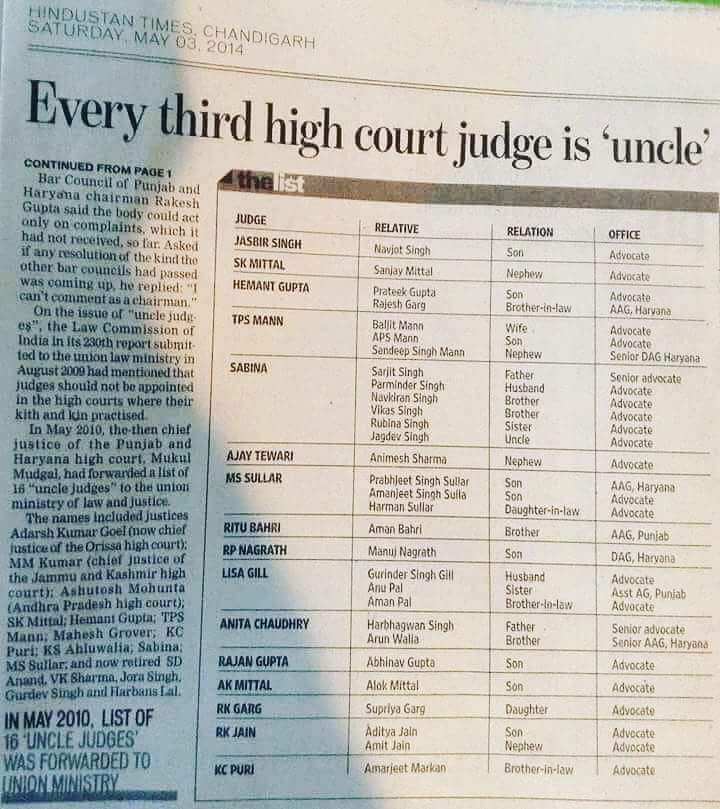Nepotism In Indian Judiciary: How Great Courtrooms Became A Family Business

Nepotism in Judiciary: The Slow Death of Justice in India
The Indian judiciary—a temple of justice or a family-run law firm? If you still believe in the fairy tale that courts exist to deliver justice, it’s time to wake up and smell the nepotism. The judicial system in India has turned into an exclusive club where only the privileged thrive, while the common man stands no chance. Sons and daughters of ex-judges and senior advocates seamlessly enter the profession, rise to power, and control the corridors of justice. Merit? That’s just a joke in these high-ceilinged courtrooms.
Meet Abhinav Chandrachud: The Latest Star Kid of Indian Judiciary
Abhinav Chandrachud—now there’s a name that’s making rounds. Not because he’s the most brilliant legal mind of our generation, but because he happens to be the son of former Chief Justice of India DY Chandrachud. And guess what? He’s representing Ranveer Allahbadia in court.

Call it coincidence, or call it pre-written destiny, but we all know how this story ends. The possibility of an adverse order against Ranveer? Almost zero. Why? Because Abhinav belongs to the judicial fraternity, and as history has proven time and again, this lobby protects its own.
Want to win a case? Here’s a pro tip by Spiritual sysmbol Allahbadia: Hire the son or daughter of a judge. Several lawyers openly admit that doing so significantly increases your chances of victory. Because once you’re represented by one of their own, judges magically become more understanding, and verdicts seem to align with your interests.
Collegium: The Greatest Judicial Scam Ever?
The biggest scam running in the judiciary today is the collegium system. A self-replicating club, the collegium ensures that judges appoint more judges from their own circle. No outsider stands a chance. Meritocracy is discarded, and nepotism flourishes. It’s a simple equation:
- A judge’s son becomes a lawyer.
- He gets access to elite legal circles and influential mentors.
- He is fast-tracked to become a senior advocate.
- He is recommended for judgeship by the collegium.
- And voilà! The next generation of the judiciary is born.
The cycle continues, ensuring that real talent and deserving candidates may or may not get an opportunity to serve the country. The judiciary stays in the hands of a select few families, much like a monarchy disguised as democracy.

Justice or a High-Profile Networking Event?
Justice should be blind, but in India, it is very much aware of last names and social circles. Let’s take a look at some examples of how nepotism has compromised the judiciary:
- Ranveer Allahbadia’s Case: The fact that Abhinav Chandrachud, son of an ex-CJI, is representing him makes it clear that power and privilege always get a golden ticket in Indian courts. If you still think justice is fair, just watch how quickly this case disappears from headlines with a favorable outcome.
- Abhishek Manu Singhvi’s Scandal: Recall how a female lawyer compromised herself in the hopes of being appointed as a judge? Will you call it her misguided decision? No, the entire system forgot and normalized such behavior. Many aspiring judges today aren’t just competing on merit but offering money, influence, and even personal favors to climb the judicial ladder.
- Pune Porshe Case: Uff, you kill two, write a 300 word essay and get rid of everything!!! Is that the cost of human life in the eyes of the Judiciary?
- The High Court and Supreme Court Musical Chairs: Ever noticed how judges rotate between the High Court and Supreme Court, ensuring their family members always get preferential treatment? It’s not a coincidence—it’s the unspoken rule of the judicial elite.
The Common Man: The Ultimate Victim
While the elite secure favorable judgments for people like Allahbadia (who wears the veil of spiritual guru and then makes such comments) the common man struggles for decades, waiting for justice that may never come.
Case backlog?
Over 4.4 crore pending cases in Indian courts. But who cares? The judicial system is too busy ensuring that star kids and elite lawyers maintain their power structure. At one end, the issue of Ranveer Allahbadia is seen as a dent on modest society and on the other hand, one of the top lawyer is standing to defend him. What an irony!
The reality is that the average citizen cannot afford justice in India. If you’re not connected, you’re just another file gathering dust in a courtroom where your case will drag on for decades. Meanwhile, high-profile clients with the right last names or financial influence get speedy resolutions.
Is The “Temple of Justice” Has Turned Into a Marketplace?
The Indian judiciary has gone from being a pillar of democracy to a marketplace where favors are exchanged. Many judges openly support their peers and their families, making it almost impossible for an outsider to break in.
The only loser in this corrupt system is the common citizen, who naively believes in a fair trial. The reality? The system is rigged.
Final Thoughts: Will the Judiciary Ever Be Fair?
At this point, expecting justice in India without privilege or influence is a fool’s dream. The system is deeply rigged, and the legal fraternity operates like a high-society club where only the privileged get access.
Until we address nepotism in the judiciary, justice will remain a luxury that only the rich and powerful can afford. Meanwhile, the common man will continue to suffer, waiting in vain for fairness that may never come.

So, the next time you hear someone say, “Justice will prevail,” ask them one question: For whom?



